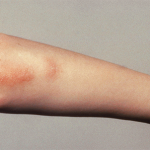
He focused on two pediatric rheumatic diseases other than sJIA in which MAS occurs relatively frequently—systemic lupus erythematosus (SLE), in which MAS affects 1–8% of children, and Kawasaki disease, in which MAS affects 1–2% of children—and emphasized the need for an accurate differential diagnosis to ensure that MAS is not underdiagnosed in children.
In making the differential diagnosis, he stressed the need to first exclude infection, malignancy, late presentation of FHL, immunodeficiency syndrome and drug-induced cytopenias and high transaminases.
To make the diagnosis of MAS in children with SLE, he emphasized that MAS often occurs within one week of diagnosis in these children and that the most common triggers are active lupus and flares, as well as infections, a less common trigger. Although the clinical features of MAS in these patients often overlap with SLE, such as active fever, he said that measuring ferritin early in febrile lupus patients can help discriminate MAS from active lupus with fever.
He emphasized that MAS and acute Kawasaki disease share many overlapping clinical features, including fever, lymphadenopathy, rash, hepatomegaly, elevated CRP and transaminases, and low albumin. Similar to patients with SLE, he said that measuring ferritin in children with Kawasaki disease with a persistent fever is important to differentiate MAS from acute Kawasaki disease. Another feature of MAS in these patients is their low platelet counts.
Table 2 lists the most common and emerging treatments for MAS in SLE and Kawasaki disease.
Mary Beth Nierengarten is a freelance medical journalist based in St. Paul, Minn.
Second Chance
If you missed this session, it’s not too late. Catch it on SessionSelect.
